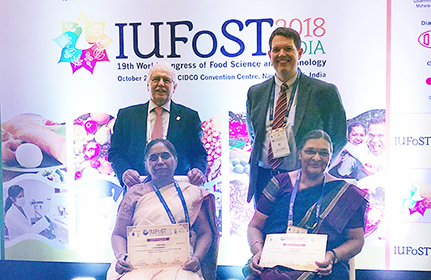19th World Congress of Food Science and Technology (IUFoST2018)
-

October 23, 2018-October 27, 2018
CIDCO Exhibition Centre
Mumbai, India
Dr. Andrew Roberts co-chaired the scientific session: Advances in Molecular Biology as Relevant to Food Technology alongside Dr. Michael Knowles at the 19th World Congress of Food Science and Technology (IUFoST2018). IUFoST2018 brought together researchers, academics, professionals, policymakers, food scientists, and private sector representatives to exchange ideas, share innovations, showcase new research, and discuss policy issues. Global developments in all the facets of food science and technology were showcased through over 60 parallel scientific sessions, with more than 250 speakers participating.
Speakers

Dr. Vibha Ahuja
Biotech Consortium India Limited
Dr. Michael Knowles
Governing Council Member, IUFoST
Dr. Lalitha R. Gowda
Former Chief Scientist, CSIR-Central Food Technological Research Institute
Dr. Andrew Roberts
Agriculture & Food Systems InstituteScientific Session: Advances in Molecular Biology as Relevant to Food Technology
History and Context for Food Safety Assessment of Foods Derived from Genetically Engineered Plants
Dr. Andrew F. Roberts, Agriculture & Food Systems Institute
When genetically engineered plants were being developed in the late 1980s and early 1990s, food safety regulators were faced with a unique challenge. Prior to this point risk assessments for foods focused on the presence of chemical and microbial contaminants while the foods themselves were considered to be safe. But in response to public policy initiatives to require pre-market safety assessment for novel foods, assessors had to develop a paradigm for assessing the safety of whole foods for the first time. This presentation will walk through some of the landmark early documents that developed the paradigm which has since been incorporated into the Codex Alimentarius Guideline for the Conduct of Food Safety Assessment of Foods Derived from Recombinant-DNA Plants (CAC/GL45-2003).
Food Safety Assessment for Genetically Engineered Plants in South Asia
Dr. Vibha Ahuja, Biotech Consortium India Ltd.
Foods derived from genetically engineered (GE) plants are widely consumed across many countries. In 2017, GE plants were grown by 24 countries in approximately 190 million hectares and imported by additional 43 countries for food and feed use. Countries in South Asian region are in varying stages of development and use of GE plants. National biosafety frameworks and guidelines for food safety assessment are in place in these countries to regulate activities involving GE plants and derived food/feed products. Authorizations for the use of GE plants/foods are currently made at the national level. Regional harmonization for safety assessment guidance will ensure that foods derived from GE plants in any South Asian country will meet the standard for safety, preventing disruptions to trade, ensuring the safety of foods for travelers between countries, and building a foundation for regional recognition of food safety authorizations, in future
Methods for the Detection, Identification, and Quantification of GM-Material in Food
Dr. Lalitha R. Gowda, CSIR-Central Food Technological Research Institute (retired)
Consequent to global commercialization of genetically modified (GM) crops, these crops and their products have been regulated by many countries requiring market traceability and labeling above an established threshold. The success of any regulatory and labeling scheme depends upon the efficiency with which a genetically modified material can be reliably detected and quantified. Detection of GMOs is focused on either identifying the altered gene(s) or their proteins product(s). The methods rely either on the polymerase chain reaction (PCR) to amplify the transgene sequence(s), or on immunological methods (primarily ELISA, the enzyme-linked immunosorbent assay) to bind to the transgene gene product(s). Both methods have their place and are both qualitative and quantitative. These molecular techniques form the foundation for GMO analyses. Owing to the increase in number and divergence of GMOs developed and commercialized, most GM detection laboratories now predominantly apply initial PCR based screenings followed by (when appropriate) more specific PCR based identification and quantification. Before PCR techniques can be used by official authorities in routine analysis, they must be validated. The potential and practicality of PCR for GM material detection are discussed in the light of actual legislation and of the constraints imposed by food production and processing.
*The authors of these abstracts declare no conflict of interest, in terms of scientific, financial, and personal.
